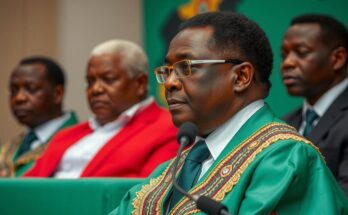Yamandu Orsi, the leftist candidate from Frente Amplio, is leading in the presidential election against Alvaro Delgado of the National Party, marking a potential shift back to leftist governance in Uruguay. Polls indicate Orsi holds approximately 49 percent of the votes. The election comes after five years of center-right rule, with voters prioritizing security and social reforms.
The Uruguayan presidential election appears to be swaying in favor of leftist candidate Yamandu Orsi from the Frente Amplio alliance, as he leads over Alvaro Delgado of the National Party, a member of the ruling Republican Coalition. Orsi’s potential victory would mark a significant political shift in Uruguay after five years of conservative governance. Polls indicate that Orsi has secured approximately 49 percent of the votes compared to Delgado’s 46.6 percent.
Uruguayans participated in the crucial second round of voting, where Orsi’s campaign gained momentum, partly due to support from former president Jose Mujica. Despite Mujica’s declining health, he emphasized the importance of the election for future generations, stating his interest in the fates of younger voters. Orsi had previously garnered 43.9 percent of the first round votes, falling short of the necessary majority for election without a runoff.
As the polls closed, concerns about national security remained paramount for many voters. This lingering issue has been a driving factor in the political discourse since the left’s exit from power in 2020, following dissatisfaction over rising crime rates linked to cocaine trafficking and economic concerns. Voting remains mandatory in Uruguay, with a strong tradition of civic engagement, highlighting the electorate’s desire for peace and stability in their communities.
Ultimately, a shift back to leftist governance could reinstate policies from the previous administration that legalized abortion, same-sex marriage, and cannabis, reflecting broader social reforms upheld during the left’s past dominance.
Uruguay’s political landscape has undergone significant changes since the leftist Frente Amplio coalition came to power in 2005, breaking a long-standing conservative dominance. This coalition maintained the presidency through three successive terms, introducing progressive reforms and social policies. However, a backlash in 2020 led to the election of a center-right government, driven by rising crime and economic concerns. The ongoing presidential election phase reflects an electorate weighing their options amid these challenges, particularly focusing on issues of safety and governance. As voters approach the polls, the shifting support dynamics underscore the desire for a return to leftist policies after years of conservative rule, setting the stage for potential social changes in the upcoming administration.
The impending outcome of Uruguay’s presidential election illustrates a decisive moment in the nation’s political history, with leftist candidate Yamandu Orsi poised to reclaim leadership from a conservative government. With widespread support attributed to former president Mujica among others, Orsi’s success may signal a renewed focus on progressive policies amid ongoing concerns about crime and social welfare. As the country stands at this crossroads, the choices of Uruguayan voters will shape not only immediate governance but also the broader socio-political implications for the future.
Original Source: www.france24.com




